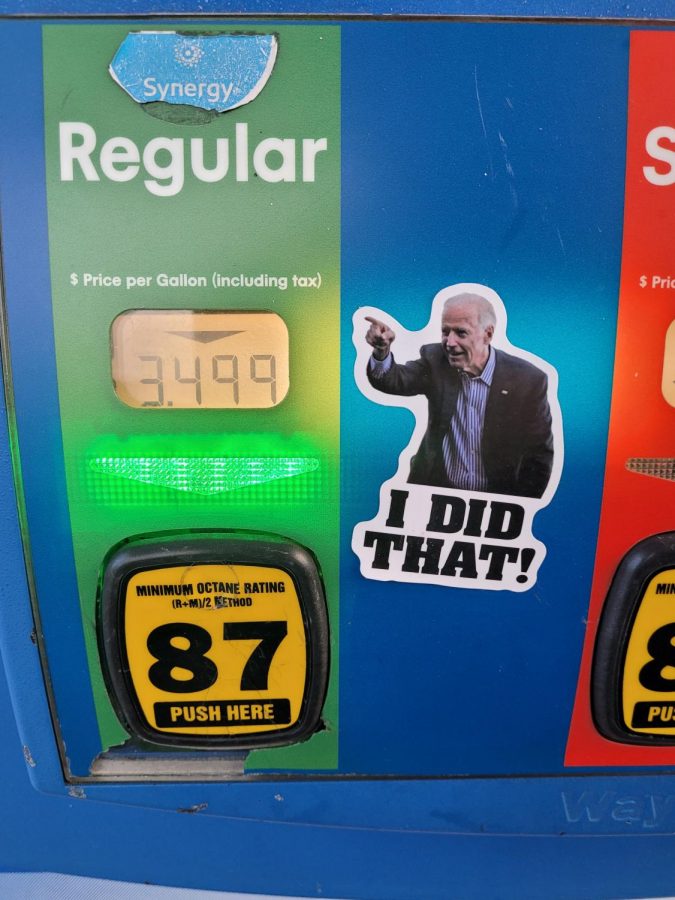Gas prices are crippling Americans, and the Biden administration is to blame
A sticker depicting President Biden on a fuel pump.
November 5, 2021
Transportation, regardless of where you live, what you do, or who you are, is an essential part of modern life. The vast majority of Americans use automobiles for personal transportation, and behind the scenes, nearly all of our consumer goods, from the food we eat to the books we read, to the aforementioned cars we drive, need to be moved from manufacturer to consumer on the roads. Road use is almost exclusive to the gas-guzzling internal combustion engine. Diesel vehicles, and in recent years hybrids and all-electric vehicles, have been hitting the streets as well, but we are still largely reliant on petroleum power.
As I am sure many students and faculty members who drive have noticed, gas prices have skyrocketed under the Biden administration. It is true that the price of gasoline fluctuates from year to year and season to season, but such high prices holding at a consistently high rate are simply unprecedented, and frankly unacceptable.
The government exists to serve the people, especially by providing for them consumer items necessary for daily life in the modern world. Institutions such as railroads, airlines, and the postal service, all have incredibly large amounts of government regulation, some even to the point of complete government control. As expected, the federal government also has strict controls over the energy market, including gasoline, through taxation, deals with OPEC (Organization of Petroleum Exporting Countries), and its constitutional blanket statement of control over commerce. If transportation is essential for daily life in America, and gasoline is currently essential for transportation, and the government has the ability to control commerce, why are gas prices so high?
There are, of course, countless answers to this problem which are cycled through by the administration responsible for this price hike. Often, the blame is pointed toward the greedy energy corporations that artificially inflate the price of gas to line their own pockets. If this were true, then the government would simply step in as it has done in numerous other essential industries and break up these corporations or impose limits on the prices which they are allowed to charge for their product. If the problem were really the greed of energy corporations, then there wouldn’t be a problem for very long.
Another handy addition to the spin-team’s toolbox is the global pandemic. It is easy, and economically sound, to blame the higher prices on a lack of supply on the global market. Again, however, if the government were actually concerned about its constituents, the supply issue could soon be solved. Subsidized gasoline could be provided to the people as an emergency action, considering we are suffering from a pandemic and that gasoline is an essential resource. The government could also take action to increase the production of energy resources through promoting hiring and offering incentives to businesses to produce larger quantities of essential consumer goods such as gas.
Naturally, no discussion of gasoline would be complete without the other classic trope, that gas should be expensive in order to encourage Americans to switch to cleaner energy. It is the hope that high gas prices will drive Americans to more “fuel-efficient” vehicles, or even electric vehicles, for their personal transportation. However, many of these so-called green vehicles end up causing more harm than good, and more work needs to be done in the field of clean energy before this solution is viable. Again, if the government genuinely cared, gas prices would be lowered to accommodate the only viable mode of transportation as of yet while encouraging research into the field of genuinely clean and renewable energy sources.
I argue that the government in fact does not care about the environment, or about helping the economy, or about bringing down greedy corporations. All the government cares about is controlling the population by increasing the people’s dependency on government handouts. While the government can not outright exert control over the citizens’ ability to travel for work or leisure, it can certainly artificially raise gas prices, thus making it more difficult for Americans to save money for the future, and increasing their dependency on government programs and bailouts. This dependency, in turn, creates a loyal voter base for the party in power. Of course, both political parties are guilty of such tactics, but the Biden administration was the one holding the baton when I was forced to shell out $14 for the four measly gallons of gas it took me to drive home to vote earlier this week.




Renee Calhoun • Nov 5, 2021 at 6:00 pm
Bravo!